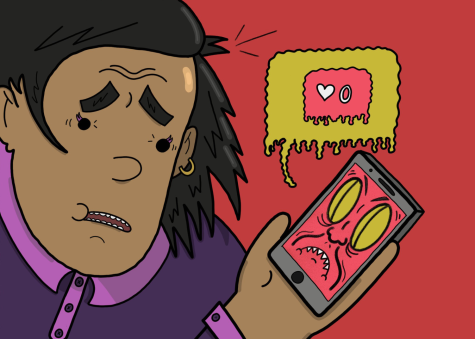Column: Who is that girl, and why isn’t she me — why social media may negatively affect mental health
February 2, 2022

When I was 12, all of my friends had the hottest device on the market at the time: the shiny iPhone 4. It was all I wanted, and I wanted it more when I would hear them talk about how they were using fun filters on Snapchat and taking pictures of their “Boxed Water Is Better” cartons for Instagram, but I had no clue what I was getting myself sucked into.
Fast-forward to when I turned 13: I got a Nexus 7 tablet. I was supposed to use it for school and reading, but the first thing my fingers searched for in the Google Play store was “Instagram.”
The minute it downloaded, I was delighted and rushed to set up my account. After following my friends and curating my feed, I quickly realized one thing: Their photos were higher quality than mine. The feeling of already having “failed” at using a social media sunk in, and I was so devastated when the pictures of my food never turned out as aesthetically pleasing as I would have liked them to.
All of my friends were posting their content and getting hundreds of likes with plenty of comments, and I was receiving no engagement. Embarrassed, I would still try it all — the Retrica-filtered selfies, the close-up eye pictures, the VSCO photos of everyday objects, all with my clunky tablet — but I still never felt like I was doing this whole Instagram thing “right.”
Even now at age 20, I still feel this way. Different trends and influencers blowing up on TikTok and Instagram all because of a fancy lamp they have or because they can afford to make premium matcha lattes everyday can easily make anyone think “why can’t that be me?” On top of having these “bougie” items, the number of likes, comments and shares makes it almost natural to equate engagement with self-worth.
During the fall semester, a new Diversity, Equity and Inclusion course, COMM 107: Social Media and Digital Strategy Foundations, was introduced to challenge that concept. In groups, students’ final projects were to propose and design new nonprofit social media platforms to support users’ mental health.
“Throughout the semester, we discussed many important social issues and mental health topics in relation to social media in this class,” said Grace Choi, assistant professor in the Communication Department. “These students have brainstormed many different ideas to create an app design and a marketing proposal for their new social media platform.”
Many of the apps offered a variety of features to combat the chances of users developing the sense of engagement equaling to their value as individuals, such as removal of “like” features, replacing comments with set reactions such as “great job,” “love this” or simple smiley faces and offering hotlines and representatives to help check-in with users about their mental health.
Through these features, social media can change how users perceive both themselves and the world.
I wish I had not joined Instagram at a time when the only other influencer who looked like me was Lily Singh. If I could go back in time and talk to the Rachel who grew up seeing people drink out of expensive water cartons or eat $15 acai bowls every day, I would tell her those things would not make her look “cool” and paying extra for special VSCO filters was not going to give her 100 likes.
I got so caught up in trying to be someone else on Instagram that I missed out on the joys of being a kid. No 13-year-old should be worried their selfie will “flop” because they did not look like their peers or they did not have the newest clothes that everyone else did.
Choi’s class allowed me to see hope for the future of social media, as Columbia students take charge with new ideas that can help make certain platforms kinder. Had options like the ones designed by the groups in the class existed when 13-year-old me stumbled across Instagram, my views of myself and the world around me would have changed. I would not have based my self-worth on how sharp my photos were, and my self-esteem would not have been crushed when my selfie got only five likes. While I sometimes still do those things, I am still a work in progress on my own personal journey to achieving self-love and peace.







